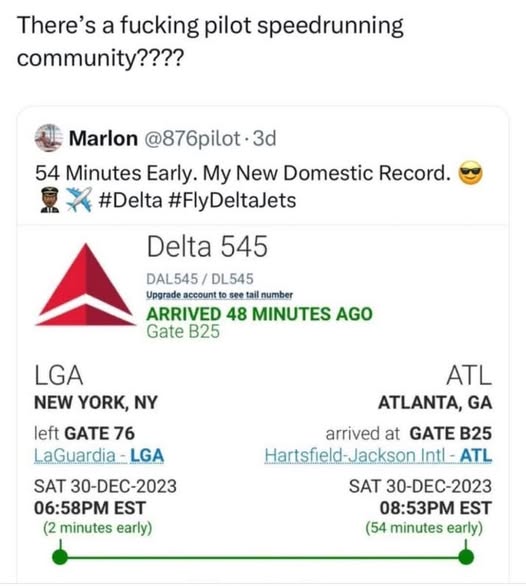this post was submitted on 14 Jan 2025
679 points (99.3% liked)
Funny: Home of the Haha
6209 readers
1274 users here now
Welcome to /c/funny, a place for all your humorous and amusing content.
Looking for mods! Send an application to Stamets!
Our Rules:
-
Keep it civil. We're all people here. Be respectful to one another.
-
No sexism, racism, homophobia, transphobia or any other flavor of bigotry. I should not need to explain this one.
-
Try not to repost anything posted within the past month. Beyond that, go for it. Not everyone is on every site all the time.
Other Communities:
-
/c/[email protected] - Star Trek chat, memes and shitposts
-
/c/[email protected] - General memes
founded 2 years ago
MODERATORS
you are viewing a single comment's thread
view the rest of the comments
view the rest of the comments

Walkarounds and such are done before takeoff, and you aren't taking off early, especially not in an airliner. In-flight checklists don't take more or less time, since the airliner is going whether you want it or not, and the pilot does not / can not just set the throttle for a faster speed. It's fine.
There are two major factors influencing travel time on an airliner, neither of them have anything to do with doing stuff faster with less attention to safety. They are airport organisation and prevailing winds.
If your departure/destination is competent and there are less complications from overworked ATC or other planes being late on arrival/departure, you're most likely fine.
The big thing though is wind. A head/tailwind can affect your ground speed to a degree of +/- 30% in extreme cases, so these are harmless. It's not even up to the pilot "going faster". There are similar posts and even articles about airliners "breaking the sound barrier", eg. having a larger ground speed than the speed of sound in static air on the ground.
I mean, the pilot can literally set the throttle for more speed? Isn't that the whole function of it? "Engine go more/less brrr?"
(I am aware of autothrottle and all that, but iirc pilots still have a lot of leeway regarding economy/speed/...)
I'm no aerospace doctor or nothin, but I'd think the pilot would be expected to stay on a very strict schedule. If they arrived at the intended airport minutes ahead of schedule they might have trouble landing when another scheduled flight is trying to land or have to awkwardly circle the runway until there is clearance.
Approach control takes care of that for airliners. They literally get told vectors to maintain.
IFR pilots follow ATC instructions throughout their flight.
I'm sure the airlines want those throttles set to the most fuel efficient setting that gets the plane there safely and on time. Fuel is expensive.
As the other response noted, arriving early can lead to headaches, but for other reasons - for example, slots at the gates are timed, so arriving before the previous plane departs won't work well. Of course this doesn't always apply, sometimes the gate is just sitting empty already.
Also, airlines have padded their schedules for years to give themselves some leeway in case of unexpected delays in taking off, landing, minor issues with the plane, etc. I assume this is a relatively small amount, like 5 or 10 minutes, but I really don't know. But it does mean the flight will show up early frequently when things are normal.